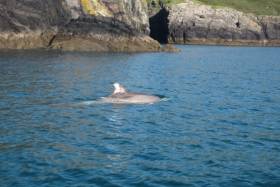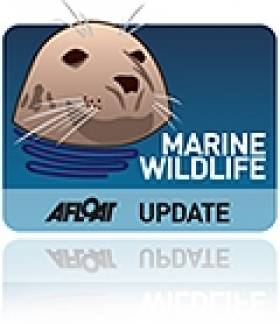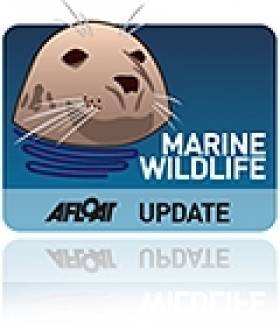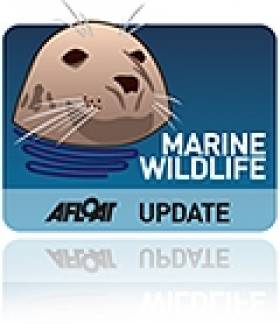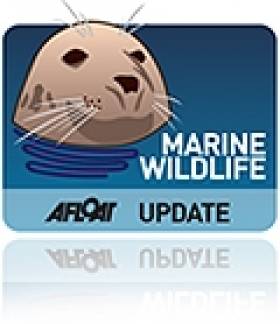Displaying items by tag: Clet
Dolphin Watchers Appeal For Recent Sightings Of 'Bad Boy' Clet
#MarineWildlife - Dolphin watchers around the UK and Ireland are keen to hear from anyone who may have spotted 'bad boy' dolphin Clet in recent weeks, as the Plymouth Herald reports.
Known as much for his distinctive dorsal fin and his aggression towards swimmers, the solo dolphin was first seen in Irish waters in the summer of 2014, and later befriended fellow 'dolphins-non-grata' Sandy, AKA Dusty, as his travels took him from West Cork to the Aran Islands.
By December that year he had moved on to the west coast of Scotland, and he was last sighted seven months ago off Portland, near Weymouth on Britain's south coast, where he had been spotted numerous times a year ago.
His disappearance since last August has worried marine wildlife observers including the Irish Whale and Dolphin Group, who have been tracking his progress since his first confirmed sightings in Brittany five years ago, though he was known to French fishermen since 2008.
The Plymouth Herald has more on the story HERE.
Marine Wildlife News: Seals Returned To Wild, Dolphin Says Adieu, Irish Sea Life Revealed
#MarineWildlife - Cute by name, cute by nature: Sherkin, Buoy and Splash were returned to the wild after being nursed back to health by the volunteers at Seal Rescue Ireland.
As the Irish Examiner reports, the three young seals – rescued after tips from the public from locations in Cork and Kerry – were rehabilitated over the past three months at the new marine wildlife refuge in Courtown.
But they were finally fit to return to the open water last weekend at Fountainstown beach in Co Cork. The Irish Examiner has much more HERE.
As three return to Irish waters, another says adieu – as Clet the lone dolphin has now been spotted off the Dorset coast, according to the Bournemouth Echo.
Last spotted between Ireland and Scotland's west coast in December, the solitary cetacean first noted in French waters in 2008 appears to have completed a full loop around the island of Ireland.
Along the way he bypassed Dingle's famous resident Fungie and spent a few days in the company of fellow 'dolphina-non-grata' Sandy, also known as Dusty.
Now he's attracting the attention of locals at Portland, south of Weymouth, across the English Channel from his original splashing grounds.
Closer to home, conservationists in the the North West of England have released a video documenting the wealth of wildlife living in the Irish Sea as a reminder to political movers and shakers of the importance of its protection.
Groups such as the North West Wildlife Trusts have criticised Westminster for 'lack of ambition' over the past year since plans for a network of well over 100 Marine Conservation Zones (MCZs) were scaled back to just 27 approvals in November 2013.
More recently a further 23 MCZs were designated proposed, only two of which are out of out of seven proposals covering the waters between Britain's west coast and Ireland (updated Tuesday 17 March).
Dolphin Visitor 'Clet' Pops Up In Scotland
#MarineWildlife - Two months after striking up a friendship with fellow 'dolphina-non-grata' Dusty in his travels around Ireland, 'bad boy' bottlenose Clet has moved on again - this time to the west coast of Scotland.
According to the Island News & Advertiser, Clet appeared in the Sound of Mull in the Inner Hebrides during the week - his first confirmed sighting after he was seen frolicking with Dusty in Galway Bay - making for a rare sighting of a solitary dolphin in the area.
“To our knowledge, this is the first time that Clet has been recorded in Scotland, and in fact this is the furthest north he has been recorded to date,” said Dr Conor Ryan, sightings officer with the Hebridean Whale and Dolphin Trust.
Pádraig Whooley of the Irish Whale and Dolphin Group (IWDG) also hailed Clet's reappearance, saying: "The addition of Scotland after a two-month interval brings his known tally of passport stamps to five countries and counting, and shows the need for international collaboration when trying to monitor these highly mobile marine mammals.”
But Scottish dolphin-watchers be warned, as Clet may have been involved in an act of aggression towards swimmers near Galway city in early October.
The Island News & Advertiser has more on the story HERE.
Dolphin Visitor Spotted Off Kerry Near Fungie's Waters
#MarineWildlife - Clet the dolphin, previously spotted in West Cork after migrating across the Celtic Sea from France, has moved to the waters off Kerry in close proximity to Dingle's friendly resident Fungie.
As previously covered on Afloat.ie, the Irish Whale and Dolphin Group (IWDG) warned curious humans not to get too close to the bottlenose traveller after reports of aggression against swimmers.
But according to Sunday Independent, Fungie himself should have nothing to fear from Clet's visit should the two come into contact, as fighting among dolphins is only likely if competing for a mate.
"Fungie could be 40 to 50 years old at this stage and is unlikely to be interested in mating," said the IWDG's Padraig Whooley.
That's one of the only things experts do know about Fungie, who continues to baffle marine scientists with his general behaviour that's so atypical of his species. Independent.ie has more on the story HERE.
In other cetacean news, the IWDG reports "huge success" in its just-completed expedition to Cape Verde to survey the region's whale activity, recording humpbacks breaching for the first time off Ilhéu Branco in the West African archipelago.
#MarineWildlife - Late summer brings fin whales flocking to West Cork in big numbers, with the Irish Whale and Dolphin Group estimating at least 20 of the second-largest ocean species sighted between Seven Heads and Galley Head.
Indeed, as IWDG sightings officer Padraig Whooley writes, the gathering "is certainly the largest validated aggregation of this species so far this year" and comes some months ahead of the usual peak from October to December.
Recommended spots for watching these fin whale visitors - though you will need some decent binoculars to get the best views - are the aforementioned Galley Head and Seven Heads as eel as Cloghna Head, Dunworley and Sandscove.
Kerry has its own share of whale visitors, with a "lovely run" of humpbacks in recent weeks, while East Coast residents aren't left out, either, with a rare sighting of a minke whale in the Irish Sea some 20km off Bray Head over a week ago.
In other cetacean news, West Cork has become home to a new solitary dolphin in the form of Clet, a bottlenose who's been spotted in Glandore, Baltimore and Schull after time from Devon, Cornwall, South Wales and originally France.
Yet as IWDG welfare officer Paul Kiernan warns, Clet might appear cute but he's very much a wild animal, with reports claiming a swimmer off Sherkin Island was "aggressively pushed underwater by the dolphin".
Such stories, Kiernan writes, point "to the need for people to exercise common sense and extreme caution in how best to enjoy an interaction with this very large, apex predator."
He adds: "Bottlenose dolphins are not cute and cuddly, they are not our 'friends' and nor do they benefit in any meaningful or long term way from interacting with humans."


























